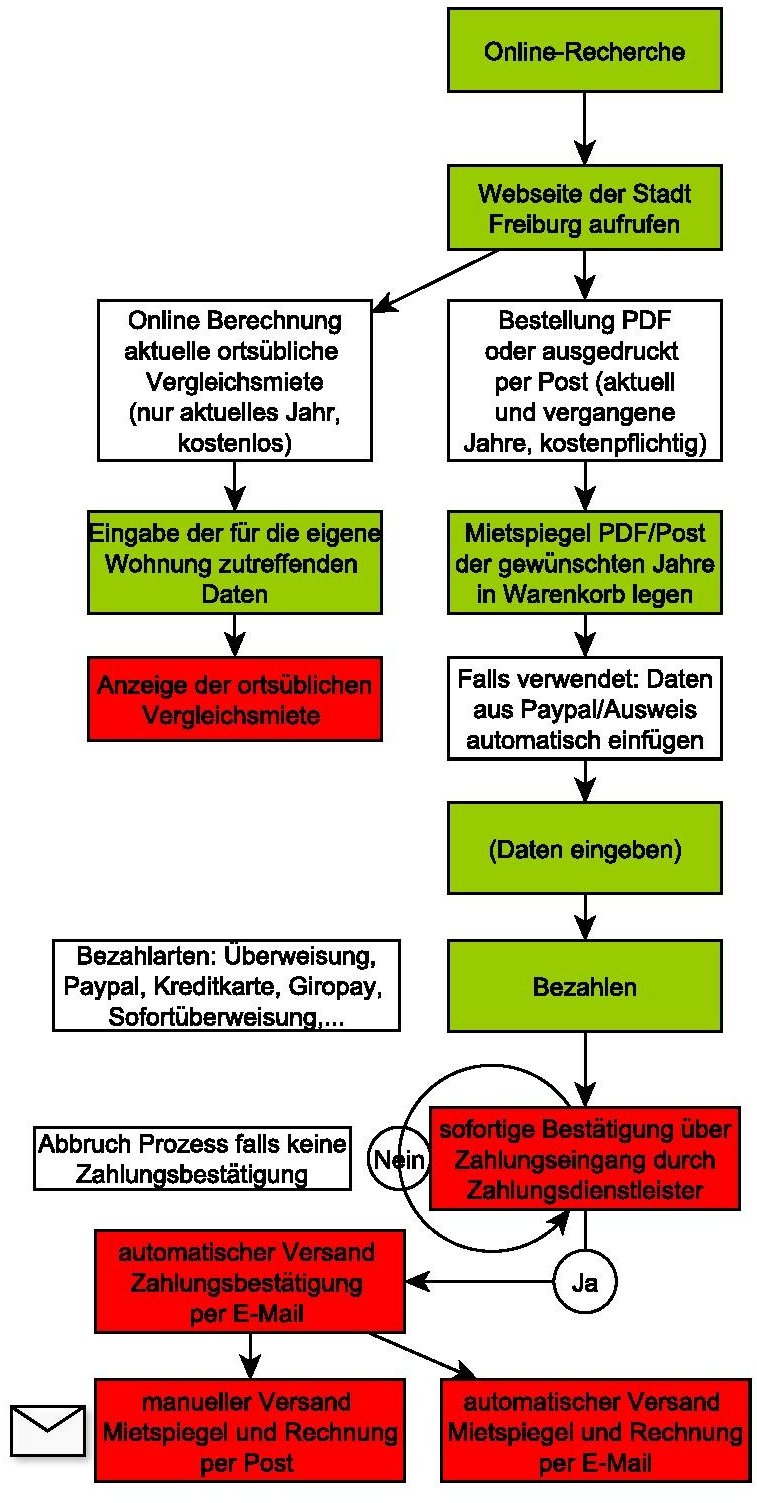
Digital rent index in 3 minutes
Veronika Akrackova and Linda Metzger
Summary
This article describes how the process of ordering a rent index in the city of Freiburg can be presented in a simplified, accessible and less complicated way. To this end, interviews were first conducted with randomly selected visitors to the city hall in Freiburg. The results of this survey formed the basis for a prototype, which will serve as an orientation tool for the internal renewal of the process of rent index ordering in the city of Freiburg. The term 'prototype' here refers to an improved version of the previous procedure, which already contains all suggestions for improvement. The aim of the prototype was to equip the old concept with a revised layout and a simplified ordering process. In addition, further assistance was provided for the employees of the city administration and the citizens. The prototype is based on a shopping basket model, as most people are familiar with this system and know how to use it intuitively.
Methodology
At the beginning of the project, the aim was to understand how the process of the ordering of a rent index was structured so far in the city of Freiburg. Firstly, this stocktaking documented how the ordering process was presented to the user and secondly, the internal process in the administration was surveyed. It was particularly important to understand where the interfaces between administration and user were located.
Expert interviews and research
An interview with the process managers of the city of Freiburg in the first phase made it possible to understand the process to this point and to identify initial possibilities for improvement. During the interview, we asked about points that had seemed unclear to us during a previous research of our own (in which we independently tried to place an order for a rent index). In this phase it was particularly important for us to understand to what extent the existing process could be changed at all in order to identify the legal and creative scope for the development of the prototype.
User interviews
Next, visitors to the city hall in Freiburg were approached and asked whether they would like to take part in a brief interview on the subject of rent indexes. During these user interviews, in which citizens clicked their way through the ordering process on a laptop, they were asked to think "out loud". This was a technique that helped us to understand where difficulties existed for interviewees. Many users said in the interview that they had either abandoned their attempt to order a rent index when they searched for it on Google, or at the latest on the confusing site of the city of Freiburg.
In the end, all the difficulties mentioned were summarized and presented in a "user journey" (Figure 1). This was equipped with a satisfaction curve in order to identify the main challenges in each step of the ordering process.

Results
Already in the first phase, various process-related problems had emerged. The first problem was that the website of the city of Freiburg was not displayed as the first result in the common search engines. Furthermore, there was a lot of text on the website that had to be scrolled through. This was later rated very negatively in the user interviews. In addition, we came across misleading formulations. During the interview with the process managers, we also found out that the invoice e-mails are still written manually instead of being replaced by automatically generated "no-reply" e-mails. The same was true for the confirmation mail after the order. This was considered very cumbersome for the city administration staff. In addition, the calculation of the rent index fees was very confusing. It was difficult to understand when processing fees had to be added and when they did not. There was also no way to leave feedback.
Through the user interviews further points of criticism could be collected, which remained undiscovered in the first phase1. This included, for example, the fact that no English-language version was made available. Furthermore, it was not possible to change the font size. Out of curiosity, we also let the users take a look at the actual rent index and in this way also received some useful opinions, which we could then pass on to those responsible for the process. In addition, we asked users if they were willing to spend money on such a product - most users were not. One of the often mentioned wishes of the users was to receive the rent index for free in the future or to be able to use a generator on the site that calculates the individual rent index for their own living space. After all, only a handful of users were able to deal with the tables and data in the rent index itself.

Innovative solution approach
The information we received from user and expert interviews was critical for the development of the prototype. In the interviews, we gave the users time to describe their personal ideal process. This is how we came to the conclusion that a shopping basket principle would best suit the process of ordering a representative list of rents. It is a common ordering process to which most web users are accustomed. The newly acquired information was finally converted into a TARGET flowchart (Figure 2), which represents the ideal process.
Some of the main findings of our research were that users wanted a faster search, a clearer and more minimalist presentation, and a better way to customize the site to their own needs. For more flexibility, more payment options were also to be offered. In order to make the ordering process clearer and easier to understand, users also want an order overview that lists the product one last time before the final order.
Our group has also learned from expert and user interviews how important it is to listen and observe at the same time. The concept of "thinking out loud" was an enormous enrichment to the interviews we conducted. The success of our concept is reflected in the fact that all our suggestions, such as the shopping basket principle, the individual rent index calculator and a free rent index as a PDF, were implemented in the same year by the city of Freiburg (see digital rent index of Freiburg).
Files

Veronika Akrackova:
Veronika Akrackova (born 25.10.1997 in Kazakhstan) is a Bachelor student at the Faculty of Political and Public Administration in Constance, where she began her studies in 2016. Together with her fellow students she created the prototype "Mietspiegel in 3 Minuten". This project was carried out as part of an in-depth seminar and was supported and led by Prof. Dr. Ines Mergel. She is currently in her sixth semester and is completing her mandatory internship at ADAMA Agriculture B.V. Amsterdam (NL) in Schaffhausen in the field of Human Resource Management. She will write her thesis in the field of agility and digitalisation in public administration.

Linda Metzger:
Linda Metzger (born 22.11. 1995 in Weingarten) is currently studying sociology and public administration at the University of Konstanz (Bachelor of Arts). She is expected to complete her studies in March 2019. Her bachelor's thesis focuses on special sibling constellations and educational success. Her interests lie in the areas of digitisation of public administration, educational research, demographic challenges for society, migration and integration.
